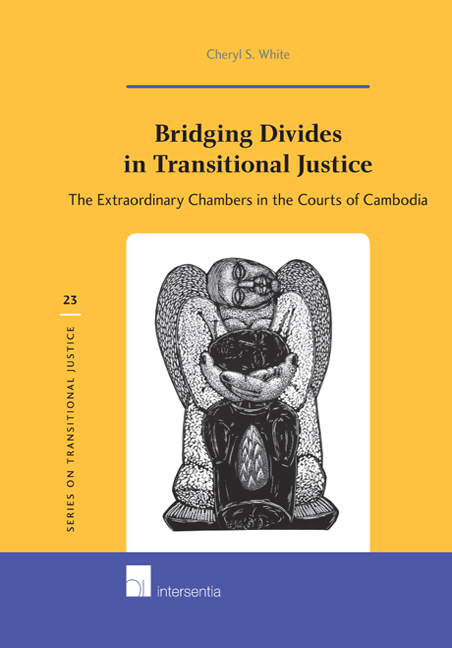Book contents
- Frontmatter
- Acknowledgements
- Contents
- Table of Cases
- Table of Legislation
- Table of Treaties
- List of Abbreviations
- Chapter 1 Introduction
- Chapter 2 Trials in Transitional Justice Theory
- Chapter 3 The Development of the Transitional Trial
- Chapter 4 The Creation of the Extraordinary Chambers in the Courts of Cambodia
- Chapter 5 Inquisitorial Criminal Procedure at the ECCC
- Chapter 6 Trial Dialogue in Case 001
- Chapter 7 The Voice of the Victim
- Chapter 8 The Voice of the Court in Judgment: Case 001
- Chapter 9 Conclusion
- Bibliography
- Index
- About the Author
Chapter 5 - Inquisitorial Criminal Procedure at the ECCC
Published online by Cambridge University Press: 27 September 2018
- Frontmatter
- Acknowledgements
- Contents
- Table of Cases
- Table of Legislation
- Table of Treaties
- List of Abbreviations
- Chapter 1 Introduction
- Chapter 2 Trials in Transitional Justice Theory
- Chapter 3 The Development of the Transitional Trial
- Chapter 4 The Creation of the Extraordinary Chambers in the Courts of Cambodia
- Chapter 5 Inquisitorial Criminal Procedure at the ECCC
- Chapter 6 Trial Dialogue in Case 001
- Chapter 7 The Voice of the Victim
- Chapter 8 The Voice of the Court in Judgment: Case 001
- Chapter 9 Conclusion
- Bibliography
- Index
- About the Author
Summary
INTRODUCTION
Controversy, missteps and delays formed part of the implementation phases of all of the Courts described in Chapter three. The ECCC had the additional challenge of instituting credible criminal procedure within a national legal system and administrative structure known for questionable justice processes and outcomes. Under these conditions, the ECCC judiciary began the delicate task of draft ing the Court's rules of evidence and procedure, the Internal Rules. This chapter discusses the fusion of Cambodian inquisitorial criminal procedure with elements of international criminal procedure to support the ECCC's internationally assisted trials.
The ECCC Internal Rules instituted inquisitorial criminal procedure based on Cambodian law, but incorporating international standards of due process. The rules also gave effect to the intricate compromises contained in the ECCC Agreement between Cambodia and the UN, discussed in Chapter four. In this chapter, the legal framework of the ECCC and the procedural scheme implemented by the Internal Rules are examined. This includes the role-sharing among senior court actors, incorporation of the civil party action within the criminal proceedings, and the supermajority formulae in judicial decisionmaking. The judiciary's recognition of the ECCC's reconciliatory purpose during the early stages of Cases 001 and 002 is also discussed. The analysis reveals the potential of these procedural features to produce representative and discursive trials. While the Court encountered difficulties in implementing victim participation rights, and the Cambodian government opposed the opening of investigations into Cases 003 and 004, the procedural regime proved sufficient to support the first internationalised trials of former Khmer Rouge leaders. The chapter highlights elements of the ECCC's structure and procedure that may have been instrumental in producing not only expressive but communicative trials.
LEGAL FRAMEWORK OF THE ECCC
The legal framework includes the Cambodian enabling law and the ECCC procedural rules, known as the ECCC Internal Rules. In Chapter three, I noted that the ECCC from its inception was described as a hybrid court, not unlike the Special Court for Sierra Leone (SCSL). However, closer analysis of the ECCC's founding instruments suggested categorisation of the ECCC as an ‘internationalised’ court, being one derived from national law but with international elements underpinned by a bilateral agreement.
- Type
- Chapter
- Information
- Bridging Divides in Transitional JusticeThe Extraordinary Chambers in the Courts of Cambodia, pp. 135 - 170Publisher: IntersentiaPrint publication year: 2017



